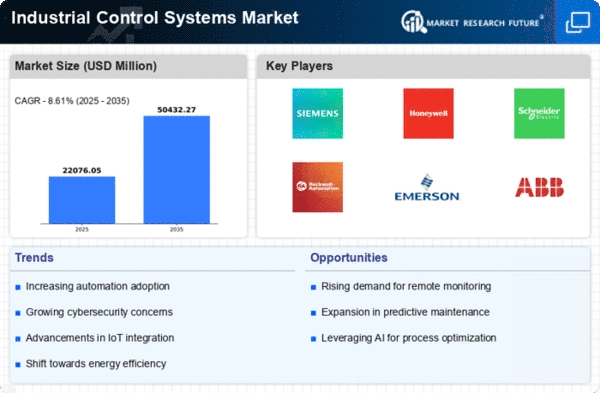Market Trends
Key Emerging Trends in the Industrial Control Systems Market
The Global market for Industrial Control Systems (ICS) is undergoing considerable drifts that are reshaping the background of industrial automation. One obvious drift is the expanding implementation of Industry 4.0 principles, marked by the integration of digital technologies into manufacturing practices. As businesses endeavor for healthier efficiency and agility, the incorporation of technologies like cloud computing within ICS and the Internet of Things (IoT) is becoming a resource optimization, extensive drift, overall escalated operational performance, and predictive maintenance.
Cybersecurity is evolving as a pivotal drift in the ICS market. With the strengthening of cyber threats pursuing industrial infrastructure, there is an escalating knowledge of the requirement for healthy cybersecurity actions. Vendors in the ICS market are considerably emphasizing enhancing the security features of their systems, incorporating innovative encryption, incursion detection, and safe communication protocols.
Standardization and interoperability are achieving dominance as prime drifts in the ICS market. As industries evolve and accept miscellaneous technologies, there is an escalating requirement for standardized and interoperable control systems. Standardization attempts are pointed at ensuring compatibility between diverse components of the ICS, admitting simpler integration, and lowering complications in industrial automation circumstances.
Sustainability is an alternative prime drift shaping the ICS market. Industries are identifying better, highlighting energy-efficient and eco-friendly practices. Consequently, the demand for ICS solutions that can supervise environmental impact, heighten energy consumption, and contribute to sustainable manufacturing means is on the uplift. Vendors are returning to this drift by extending ICS systems that appear to have originated to support green initiatives, supporting the global underline on environmental conservation.
The commencement of machine learning and artificial intelligence (AI) is experiencing the ICS market, advancing to augmented decision-making and increased automation capabilities. AI-propelled analytics are being mingled into ICS to allow predictive maintenance, anomaly detection, and optimization of manufacturing workflows, as well as to examine massive sections of data supplied by industrial procedures.
In the end, the Global market for Industrial Control Systems is undergoing considerable revolutions propelled by prime drifts that show the progressing requirements of industries. The push for interoperability and standardization, implementation of Industry 4.0 values, integration of edge computing, emphasis on sustainability, heightened focus on cybersecurity, and infusion of machine learning and AI are all instrumental to an active and groundbreaking ICS market.

















Leave a Comment